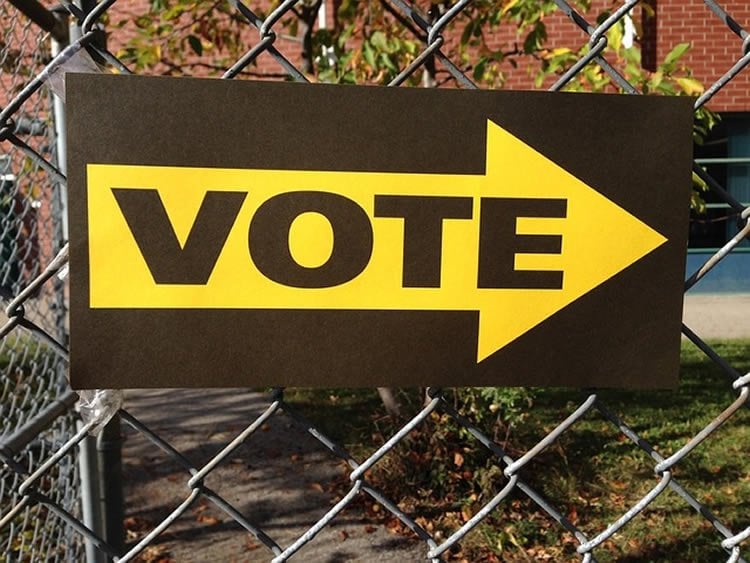Candidate voice pitch influences voters.
Two new studies show that the tone of a candidate’s voice can influence whether he or she wins office.
“Our analyses of both real-life elections and data from experiments show that candidates with lower-pitched voices are generally more successful at the polls,” explains Casey Klofstad, associate professor of political science at the University of Miami College of Arts and Sciences, who is corresponding author on both studies.
The first study, published online in Political Psychology, shows that candidates who ran in the 2012 U.S. House elections and had lower voices were more likely to win their elections. These findings are more complex, however, once the sex of the candidate and his or her challenger is accounted for. When facing male opponents, candidates with lower voices won a larger vote share. But, when facing female opponents, candidates with higher voices were more successful and particularly so in the case of male candidates. “As individuals with lower voices have higher levels of testosterone, and as testosterone correlates with physical and social aggressiveness, it could be that male candidates with lower voices are perceived as too aggressive when paired against a female opponent,” Klofstad said.
The second study, published online in the open-access journal PLOS ONE, used an experiment to examine why voters prefer leaders with lower voices. In the experiment Klofstad and his colleagues asked study participants to listen to pairs of recorded voices that had been manipulated to vary only in pitch. The participants were then asked which voice of each pair was stronger, more competent, older, and which voice they would vote for. The results of the experiment show that the preference for leaders with lower-pitched voices correlates with the perception that speakers with lower voices are stronger, more competent, and older, but the influence of perception of age on vote choice is the weakest of the three. Both studies were conducted and funded at Duke University, where Professor Klofstad spent the 2014 academic year.

“While these findings add to our understanding of why voters prefer leaders with lower voices, future studies are needed to test whether people with lower voices are actually stronger and more competent leaders,” Klofstad said.
These two new studies illustrate that while voters consciously consider their own political preferences and those of the candidates when casting their ballots, voters also make thin impressionistic judgments based on far more subtle factors of which they may not be aware. Importantly, these factors may not be relevant to a candidate’s leadership ability, which calls into question whether voters are actually capable of making reasoned choices at the polls.
The first study is titled “Candidate voice pitch Influences election outcomes,” and is available online from Political Psychology. The second study is titled “Perceptions of competence, strength, and age influence voters to select leaders with lower-pitched voices,” and is also available online from PLoS ONE. Co-authors of the second study are Rindy C. Anderson, assistant professor of biological sciences at Florida Atlantic University; and Stephen Nowicki, Bass Fellow and professor of biology at Duke University.
Funding: The studies were funded by Duke University.
Source: Barbara Gutierrez – University of Miami
Image Source: The image is in the public domain
Original Research: Abstract for “Candidate Voice Pitch Influences Election Outcomes” by Casey A. Klofstad in Political Psychology. Published online July 3 2014 doi:10.1111/pops.12280
Full open access research for “Perceptions of Competence, Strength, and Age Influence Voters to Select Leaders with Lower-Pitched Voices” by Casey A. Klofstad, Rindy C. Anderson, Stephen Nowicki in PLOS ONE. Published online August 7 2015 doi:10.1371/journal.pone.0133779
Abstract
Candidate Voice Pitch Influences Election Outcomes
A growing literature in psychology shows that human voice pitch—perceived “highness” or “lowness” as determined by the physiology of the throat—influences how speakers are perceived. This leads to the prediction that candidate voice pitch influences voters. Here this question is addressed with two studies. The first is an experiment conducted with a large national sample of U.S. adults. The results show that men and women prefer to vote for male and female candidates with lower pitched voices. The second study examines the outcomes of the 2012 U.S. House elections. When facing male opponents, candidates with lower voices won a larger vote share. However, when facing female opponents, candidates with higher voices were more successful and particularly so in the case of male candidates. In synthesizing research on the human voice and voter behavior and triangulating evidence from a controlled experiment and a large observational study of actual elections, this article illustrates that candidate voice pitch influences election outcomes.
“Candidate Voice Pitch Influences Election Outcomes” by Casey A. Klofstad in Political Psychology. Published online July 3 2014 doi:10.1111/pops.12280
Abstract
Perceptions of Competence, Strength, and Age Influence Voters to Select Leaders with Lower-Pitched Voices
Voters prefer leaders with lower-pitched voices because they are perceived as stronger, having greater physical prowess, more competent, and having greater integrity. An alternative hypothesis that has yet to be tested is that lower-pitched voices are perceived as older and thus wiser and more experienced. Here the relationships between candidate voice pitch, candidate age, and electoral success are examined with two experiments. Study 1 tests whether voters discriminate on candidate age. The results show that male and female candidates in their 40s and 50s, the time in the lifecycle when voice pitch is at its lowest, are preferred over candidates in their 30s, 60s, and 70s. Study 2 shows that the preference for leaders with lower-pitched voices correlates with the perception that speakers with lower voices are stronger, more competent, and older, but the influence of perception of age on vote choice is the weakest of the three.
“Perceptions of Competence, Strength, and Age Influence Voters to Select Leaders with Lower-Pitched Voices” by Casey A. Klofstad, Rindy C. Anderson, Stephen Nowicki in PLOS ONE. Published online August 7 2015 doi:10.1371/journal.pone.0133779






